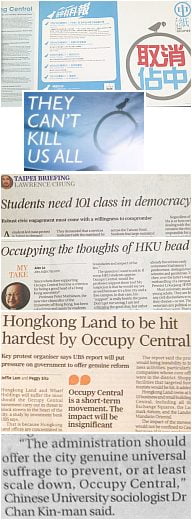Tanya Chan of Hong Kong’s pro-democracy Civic Party thrust an Occupy Central leaflet into my hands on Monday morning as I stepped off the Mid-Levels Escalator. Having just flicked through it, I find that I narrowly missed ‘Non-violence disobedience training’ over the weekend. Among forthcoming events: ‘Deliberation Day’ on May 6 and ‘The Pledging Day’ on July 1.
Recent pro-autonomy demonstrations in Taiwan – attended by Tania and others – seem to have given Hong Kong’s Occupy Central a timely extra dash of relevance and impetus. Piffling details aside, the parallels between Taipei’s ‘sunflower’ protests and the Big Lychee’s movement are just too good for local pro-democrats and maybe the world beyond to ignore.
 The opposing forces of darkness have presumably pondered the differences and similarities between the two territories’ respective brands of rebelliousness. The central government in Beijing and its ideological adherents and obedient retainers here are conspicuously silent. Perhaps they are waiting for the Communist Party to hand down its official and ever-so logical and convincing explanation of why some Hong Kong and Taiwan compatriots so perversely resist the motherland’s munificent embrace.
The opposing forces of darkness have presumably pondered the differences and similarities between the two territories’ respective brands of rebelliousness. The central government in Beijing and its ideological adherents and obedient retainers here are conspicuously silent. Perhaps they are waiting for the Communist Party to hand down its official and ever-so logical and convincing explanation of why some Hong Kong and Taiwan compatriots so perversely resist the motherland’s munificent embrace.
That leaves the commerce-driven shoe-shiners to go on the offensive. One South China Morning Post columnist decries the Taiwanese protestors’ immaturity about their democratically elected President’s plan to turn their country into another Mongkok, where Mainlanders’ baby milk outlets outnumber 7-Elevens by almost four to one. (Thomas Jefferson or dozens of others could help him with the basics, though it would take an Einstein to conceptualize something outnumbering 7-Elevens four to one.) Another is sorely vexed by HK University’s Vice-Chancellor saying he supports students’ right to protest, or by reporters asking him to say he does.
Most curiously, the SCMP reports a ‘study’ by investment bank UBS that purports to show which Hong Kong companies will ‘suffer the most’ if Occupy Central goes ahead. The methodology seems refreshingly straightforward. The researcher has counted up how much space different landlords own in our main business districts (which is public information) and assumed that the pro-democracy sit-in will inflict unspecified damage (nonpayment of rents by tenants?) in proportion to each company’s downtown square footage. As you don’t need to be told, Hong Kong Land comes top in Central.
The next step should be for the reporters to get a quote from a mouth-frothing patriot about how Tanya Chan and buddies are going to wreak havoc of Hiroshima-proportions and cost the city billions and billions of dollars and tarnish our global reputation for orderly, uncluttered streets. But the patriots are awaiting mouth-frothing advisories from on high, so the newshounds track down an Occupy-connected sociologist (obviously) at Chinese U. In the manner of the naïve leading the naïve, the academic apparently shares with the journalists his vision of the local administration (thus, Beijing, thus the Chinese Communist Party) rushing to grant Hong Kong full universal suffrage to avoid alarming foreign investors (that’s UBS and its ‘study’) who are fretting about the big landlords.
Two explanations: UBS is plumbing the depths of shameless groveling to Beijing in order to get a slice of the latest Mainland mega-IPO; or the bank mistimed a brilliant April Fool’s hoax.

